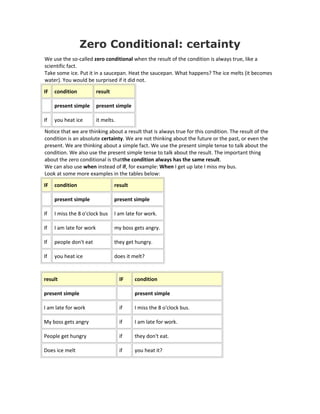
Zero conditional
- 1. Zero Conditional: certainty We use the so-called zero conditional when the result of the condition is always true, like a scientific fact. Take some ice. Put it in a saucepan. Heat the saucepan. What happens? The ice melts (it becomes water). You would be surprised if it did not. IF condition result present simple present simple If you heat ice it melts. Notice that we are thinking about a result that is always true for this condition. The result of the condition is an absolute certainty. We are not thinking about the future or the past, or even the present. We are thinking about a simple fact. We use the present simple tense to talk about the condition. We also use the present simple tense to talk about the result. The important thing about the zero conditional is thatthe condition always has the same result. We can also use when instead of if, for example: When I get up late I miss my bus. Look at some more examples in the tables below: IF condition result present simple present simple If I miss the 8 o'clock bus I am late for work. If I am late for work my boss gets angry. If people don't eat they get hungry. If you heat ice does it melt? result IF condition present simple present simple I am late for work if I miss the 8 o'clock bus. My boss gets angry if I am late for work. People get hungry if they don't eat. Does ice melt if you heat it?
